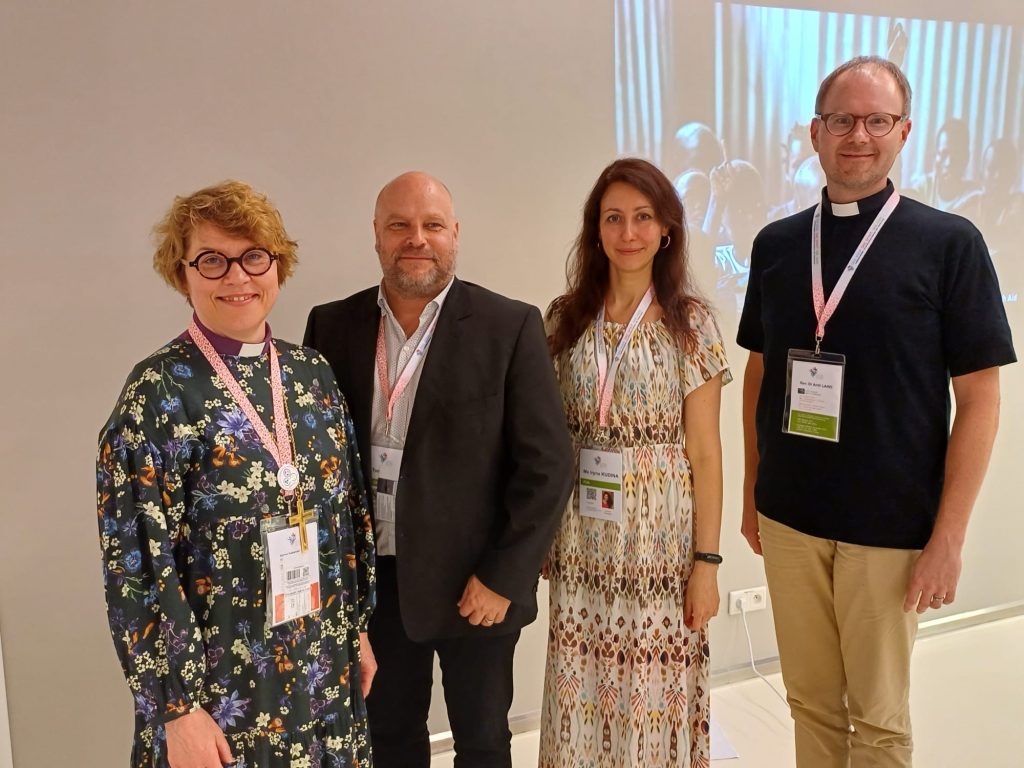FCA-led panel stressed importance of education at Lutheran World Federation Assembly
Representatives of Lutheran churches from around the world gathered at the 13th Assembly of the Lutheran World Federation in Krakow, Poland. The discussions of the Assembly highlighted the responsibility of churches to act for a world that is just to all. Finn Church Aid organised a panel discussion at the assembly on the theme of the importance of education in crises.
Education gives hope during crises
More than 200 million children and youth living in crisis areas need support for education. Providing education in emergencies and protracted crises is one of the key aspects of FCA’s work. In the panel discussion “Hope in the midst of crisis through quality education” organized by FCA, bishop Kaisamari Hintikka, executive director Tomi Järvinen and project manager Iryna Kudina discussed the importance of access to education as part of humanitarian aid.
“Quality education protects cognitive development and supports psychosocial well-being. In times of crisis, education offers children a sense of hope. Learning is a routine, and it cannot be broken. As an example, in Ukraine education often takes places in equipped shelters where children go during air raid alerts. Starting from September this year, Kharkiv city, which is very close to the frontline, introduced a school in the metro station. Education is so important that children are ready to study even underground.”, explained Kudina, who works in FCA’s country office in Ukraine.
During crises, teachers’ skills in psychosocial support also become valuable. The training of teachers is part of FCA’s education projects in Ukraine but also elsewhere, for example, in Uganda and Kenya, where FCA provides education for children and youth in refugee settlements.
Tomi Järvinen highlighted the importance of education in coping with crisis situations: “although talking about peace can be sensitive in the middle of a conflict, peace and the future are already being built in classrooms. It’s important to make sure that children learn skills to deal with trauma and recover together.”
The panel discussion was part of the wider LWF Assembly progamme. Therefore, Bishop Hintikka reminded attendees of the role of churches and other local religious actors, both as organisers of education, and as significant actors of humanitarian aid in their own regions. Hintikka also emphasised the close connection between education and Lutheran tradition, in which promotion of literacy has always been important principle.

LWF is FCA’s partner in international diaconia
The Lutheran World Federation was founded in 1947 and consists of 150 member churches in 99 countries. The Assembly is LWF’s highest decision-making organ, which convenes every 6–7 years. Along with theological questions, humanitarian aid and work to help refugees have been part of LWF’s core activities from the very beginning. This is how LWF implements the international diaconal work of Lutheran churches. Today, LWF’s Department of World Service has humanitarian aid activities and development cooperation projects in 25 countries in Africa, Asia and Latin America.
Finn Church Aid and the Lutheran World Federation are long-term partners. FCA cooperates with the LWF to promote, among other things, human rights, gender justice and interreligious dialogue. FCA also supports LWF work to strengthen the churches’ disaster preparedness and contributes annually to organising women’s human rights advocacy training.
FCA’s other global ecumenical partners are the ACT Alliance and the World Council of Churches.
Text: Sini Tyvi
Photos: Johanan Celine Valeriano / LWF and Anna Patronen / ELCF Communications